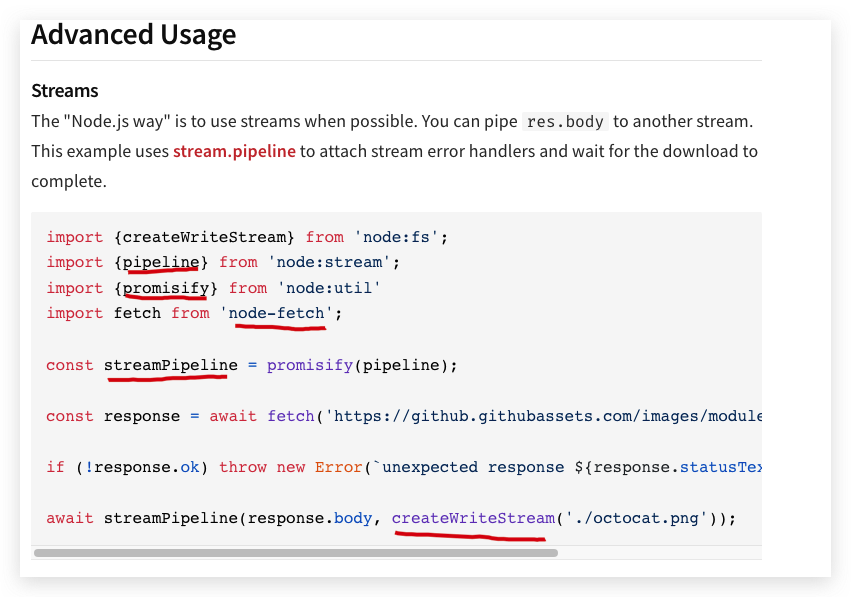node-fetch Advanced Usage All In One
node-fetch Advanced Usage All In One
fetch
// stream
https://www.npmjs.com/package/node-fetch#streams

demos
Node.js web crawler
import fetch from "node-fetch";
import path from 'node:path';
import {fileURLToPath} from 'node:url';
// import fs from 'node:fs';
import {createWriteStream} from 'node:fs';
import {pipeline} from 'node:stream';
import {promisify} from 'node:util'
// const __filename = fileURLToPath(import.meta.url);
// const __dirname = path.dirname(__filename);
// console.log(`import.meta.url`, import.meta.url)
// console.log(`__dirname`, __dirname)
async function downloadFile(url, path) {
const streamPipeline = promisify(pipeline);
fetch(url).then(async (res) => {
if (!res.ok) {
throw new Error(`unexpected response ${res.statusText}`);
}
console.log(`✅ res =`, res)
return await streamPipeline(res.body, createWriteStream(path));
}).catch(err => {
console.log(`❌ err =`, err)
}).finally(() => {
console.log(`finally 👻`)
})
}
// async function downloadFile(url, path) {
// const streamPipeline = promisify(pipeline);
// const res = await fetch(url)
// if (!res.ok) {
// throw new Error(`unexpected response ${res.statusText}`);
// }
// // console.log(`✅ res =`, res)
// await streamPipeline(res.body, createWriteStream(path));
// }
// const url = `https://edu-vod.lagou.com/sv/2daa3bb9-1765150ee6e/2daa3bb9-1765150ee6e.mp4`
// const url = `https://cdn.xgqfrms.xyz/video/web-testing.mp4`
const url = `https://cdn.xgqfrms.xyz/video/web-testing.mp5`
await downloadFile(url, "./test.mp4");
/*
$ node ./node-fetch.js
*/
axios
import axios from 'axios';
// import axios, {isCancel, AxiosError} from 'axios';
// import fs from 'node:fs';
import {createWriteStream} from 'node:fs';
// import path from 'path';
// import { fileURLToPath } from 'url';
// const __filename = fileURLToPath(import.meta.url);
// const __dirname = path.dirname(__filename);
// console.log(`import.meta.url`, import.meta.url)
// console.log(`__dirname`, __dirname)
// async function downloadFile(url, path) {
// const res = await axios({
// url,
// method: "GET",
// responseType: "stream",
// });
// console.log(`✅ content-type =`, res.headers['content-type'])
// res.data.pipe(createWriteStream(path));
// }
async function downloadFile(url, path) {
await axios({
url,
method: "GET",
responseType: "stream",
}).then(res => {
console.log(`✅ content-type =`, res.headers['content-type'])
return res.data.pipe(createWriteStream(path));
}).catch(err => {
console.log(`❌ err =`, err)
}).finally(() => {
console.log(`finally 👻`)
})
}
// const url = `https://edu-vod.lagou.com/sv/2daa3bb9-1765150ee6e/2daa3bb9-1765150ee6e.mp4`
const url = `https://cdn.xgqfrms.xyz/video/web-testing.mp4`
await downloadFile(url, "./test.mp4");
/*
$ node ./axios.js
*/
Streams
Types of streams
There are four fundamental stream types within Node.js:
Writable: streams to which data can be written (for example,fs.createWriteStream()).Readable: streams from which data can be read (for example,fs.createReadStream()).Duplex: streams that are both Readable and Writable (for example,net.Socket).Transform: Duplex streams that can modify or transform the data as it is written and read (for example,zlib.createDeflate()).
Additionally, this module includes the utility functions stream.pipeline(), stream.finished(), stream.Readable.from() and stream.addAbortSignal().
import { pipeline } from 'node:stream/promises';
import { createReadStream, createWriteStream } from 'node:fs';
import { createGzip } from 'node:zlib';
await pipeline(
createReadStream('archive.tar'),
createGzip(),
createWriteStream('archive.tar.gz'),
);
console.log('Pipeline succeeded.');
https://nodejs.org/dist/latest-v18.x/docs/api/stream.html
The WHATWG Streams Standard (or "web streams") defines an API for handling streaming data.
It is similar to the Node.js Streams API but emerged later and has become the "standard" API for streaming data across many JavaScript environments.
There are three primary types of objects:
ReadableStream- Represents a source of streaming data.WritableStream- Represents a destination for streaming data.TransformStream- Represents an algorithm for transforming streaming data.
import {
ReadableStream,
} from 'node:stream/web';
import {
setInterval as every,
} from 'node:timers/promises';
import {
performance,
} from 'node:perf_hooks';
const SECOND = 1000;
const stream = new ReadableStream({
async start(controller) {
for await (const _ of every(SECOND))
controller.enqueue(performance.now());
},
});
for await (const value of stream)
console.log(value);
https://nodejs.org/dist/latest-v18.x/docs/api/webstreams.html
Modules: node:module API
ESM
// module.mjs
// In an ECMAScript module
import { builtinModules as builtin } from 'node:module';
CJS
// module.cjs
// In a CommonJS module
const builtin = require('node:module').builtinModules;
https://nodejs.org/dist/latest-v18.x/docs/api/module.html
node:fs vs fs
import fs from 'node:fs';
import fs from 'fs';
node:类似https://,file://是一种通信协议 ❓
https://stackoverflow.com/questions/67554506/what-are-the-nodefs-nodepath-etc-modules
refs
https://byby.dev/node-download-image
©xgqfrms 2012-2025
www.cnblogs.com/xgqfrms 发布文章使用:只允许注册用户才可以访问!
原创文章,版权所有©️xgqfrms, 禁止转载 🈲️,侵权必究⚠️!
本文首发于博客园,作者:xgqfrms,原文链接:https://www.cnblogs.com/xgqfrms/p/17659774.html
未经授权禁止转载,违者必究!



【推荐】国内首个AI IDE,深度理解中文开发场景,立即下载体验Trae
【推荐】编程新体验,更懂你的AI,立即体验豆包MarsCode编程助手
【推荐】抖音旗下AI助手豆包,你的智能百科全书,全免费不限次数
【推荐】轻量又高性能的 SSH 工具 IShell:AI 加持,快人一步
· TypeScript + Deepseek 打造卜卦网站:技术与玄学的结合
· Manus的开源复刻OpenManus初探
· AI 智能体引爆开源社区「GitHub 热点速览」
· C#/.NET/.NET Core技术前沿周刊 | 第 29 期(2025年3.1-3.9)
· 从HTTP原因短语缺失研究HTTP/2和HTTP/3的设计差异
2022-08-27 iPhone 外接移动固态硬盘 All In One
2022-08-27 三星固态硬盘 All In One
2022-08-27 2022 最新中国电影票房排行榜 All In One
2021-08-27 how to using js get canvas text content All In One
2020-08-27 Dart Generic All In One
2020-08-27 how to create react custom hooks with arguments All In One
2020-08-27 Go lang All In One